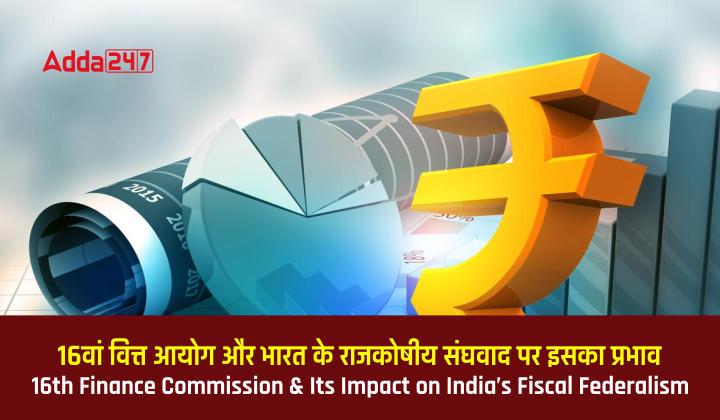Table of Contents
Indian government’s recent approval of the terms of reference for the 16th Finance Commission (FC) marks a pivotal moment in the evolving landscape of fiscal federalism in India. This move, compliant with Article 280 of the Constitution, anticipates significant deliberations on the distribution of financial resources between the Center, state, and local governments. This article delves into the functions and impacts of the Finance Commission, particularly in the context of the Goods and Services Tax (GST) and other recent fiscal changes.
Finance Commission: An Overview
Constitutional Mandate
The Finance Commission, established under Article 280 of the Indian Constitution, plays a crucial role in defining the financial relations between the central and state governments. It is tasked with recommending methods for the distribution of tax revenues between these entities.
Appointment and Composition
The Commission, which the President appoints, has a chairman and members with backgrounds in public affairs, finance, and economics to ensure a comprehensive approach to fiscal management.
Article 280 and the Finance Commission’s Functions
Article 280
Article 280 mandates the formation of a Finance Commission every five years. It outlines the Commission’s primary responsibility: to evaluate and recommend the distribution of the net proceeds of taxes between the Center and the states.
Key Functions
The Commission’s functions extend to addressing imbalances in tax powers and expenditure responsibilities and ensuring equitable distribution of resources across states.
Journey: From the 15th to the 16th Finance Commission
Fifteenth Finance Commission
Chaired by N.K. Singh, of the 15th Commission, made significant recommendations for the 2020–26 period, including a 41% share of central taxes for states. It marked a slight decrease from the previous Commission’s recommendation, considering the new union territories.
Sixteenth Finance Commission
Set to cover 2026–27, the 16th Commission’s recommendations will be pivotal in the 2026–27 budget. It faces the challenge of reassessing tax-sharing principles in the context of India’s evolving fiscal federalism.
Fiscal Federalism and GST: A Paradigm Shift
GST Effect
The implementation of the Goods and Services Tax (GST) marked a significant shift in fiscal federalism. It brought concurrent powers of indirect taxation to the Union and states, necessitating a re-evaluation of fiscal relationships.
Re-examining Tax-Sharing Principles
16th Commission must navigate this altered landscape, balancing the need for uniform public services with the unique fiscal capacities of different states.
Analyzing Vertical and Horizontal Sharing
Understanding the terms
Vertical sharing refers to the distribution of tax revenues between central and state governments, while horizontal sharing involves the allocation among states themselves based on criteria like population, income levels, and fiscal needs.
Recommendations for the 16th Finance Commission
Addressing current challenges
The Commission should consider the impact of GST on state revenues, ensuring a fair and equitable distribution system. It must also address issues like regional disparities and revenue deficits.
Anticipating Future Trends
Looking ahead, the Commission needs to factor in emerging economic trends, demographic changes, and environmental concerns when proposing a forward-looking fiscal framework.
Path Ahead for the 16th Finance Commission
Revisiting Tax-Sharing Principles
In light of GST and other fiscal changes, the 16th FC must reassess tax-sharing principles. This involves striking a balance between ensuring sufficient revenue for the state and maintaining the Center’s fiscal health.
Anticipating Changes and Challenges
The Commission should anticipate evolving economic conditions, demographic shifts, and the growing need for sustainable development. This foresight will be crucial in crafting recommendations that are resilient and adaptable to future changes.
Disaster Management Fund Review: Given the increasing environmental and health challenges, the 16th FC’s review of disaster management funds is timely.
This review should focus on creating robust mechanisms for quick and effective resource allocation during crises.
Conclusion
16th Finance Commission stands at the crossroads of India’s fiscal future. The decisions will significantly impact the central-state financial dynamics and the overall economic health of the country. It is imperative that the Commission’s recommendations are forward-looking, equitable, and conducive to the nation’s long-term sustainable development. As the Commission prepares its report for the 2026–27 budget, all eyes will be on its approach to redefining India’s fiscal federalism in an era of rapid economic and environmental change.



 TSPSC Group 1 Question Paper 2024, Downl...
TSPSC Group 1 Question Paper 2024, Downl...
 TSPSC Group 1 Answer key 2024 Out, Downl...
TSPSC Group 1 Answer key 2024 Out, Downl...
 UPSC Prelims 2024 Question Paper, Downlo...
UPSC Prelims 2024 Question Paper, Downlo...




